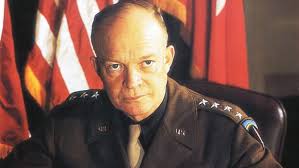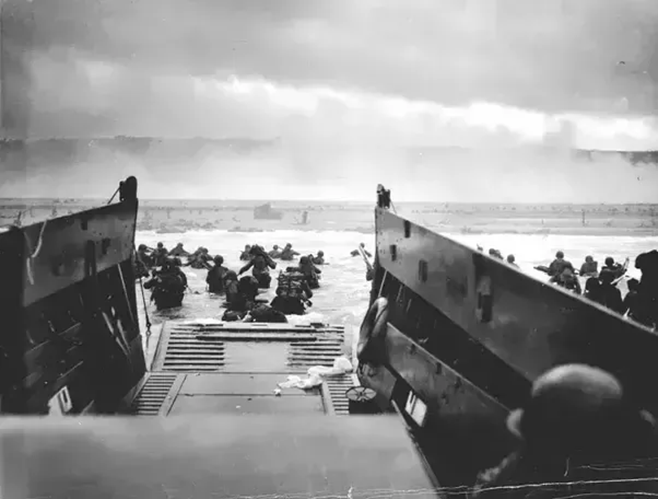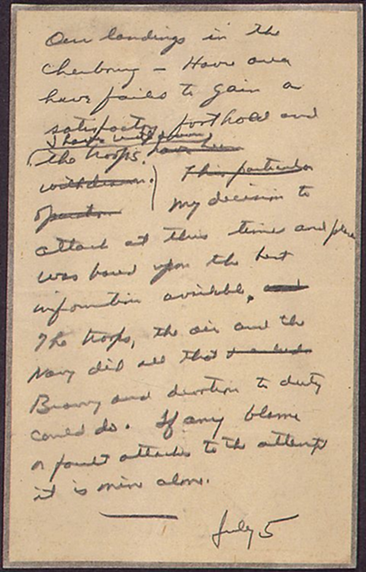
The room was tense with anxiety. Smoke from the handful of chain-smoking generals and admirals hung in the air like an ominous fog. Seventy-five years ago today, in the early evening hours of June 5, 1944, the fate of Western Civilization hung on the words of one man in that room.
That man was General Dwight D. Eisenhower, the supreme commander of Allied Expeditionary Forces in Europe in World War II. The place was Southwick House in Hampshire, England. General Eisenhower wrestled with a decision that would unleash 156,000 young men to travel by ship and plane over the English Channel to attack the German army dug in at Normandy, France. By the first week of June 1944, Nazi Germany controlled most of Western Europe. Everyone in the smoky room waited with anxious anticipation for Eisenhower’s decision.
Eisenhower was willing to take the full blame should D-Day fail…it’s an example of a leader taking responsibility.
Twenty-four hours earlier, bad weather had hit the English Channel and Eisenhower wisely postponed the assault, originally scheduled for June 5. With continued poor weather, Eisenhower struggled with the decision to either attack the following morning, June 6, or postpone the massive assault yet again.
All in the room knew that the list of potential invasion dates were only a precious few. This was due to the need for a full moon to illuminate obstacles and landing places for gliders, as well as a low tide at dawn to expose the elaborate underwater defenses installed by the Germans. The complex operation, the largest sea invasion ever attempted, also required optimal weather conditions. High winds and rough seas could capsize landing craft and sabotage the amphibious assault; wet weather could bog down the army and thick cloud cover could obscure the necessary air support.

As the rain continued to batter the windows of Southwick House on that cold, damp evening of June 5, Eisenhower and his senior commanders were given a promising but cautious report from the staff meteorologist at 9:45 p.m. He informed them that while weather conditions were predicted to worsen over the next two weeks, the current storm may abate a bit the following morning.
Eisenhower polled each commander on their recommended courses of action. There was no consensus. The decision was his and his alone.
After a long pause, Eisenhower quietly told his staff, “I don’t like it…but we have to go”. With those words the largest sea invasion in history was unleashed. June 6 would be D-Day.
All knew the battle would be ferocious. All knew the enormity of what was stake. And all knew, certainly to include General Eisenhower, chances for an allied victory were at best 50 – 50.
Knowing that defeat was as likely as victory, later in the evening of June 5 when Eisenhower was alone with his thoughts, he scribbled a note in which he accepted all blame in case the mission failed. The note remained crumpled up in his pocket – he told no one of its existence – and nervously awaited the outcome of the battle.
Fortunately, as we all know today, the note never had to be used. On June 8, 1944, after years of painstaking planning and preparation, Eisenhower was able to report that the Allies had made a harrowing and deadly, but ultimately successful, landing on the beaches of Normandy. Within a year Nazi Germany would be defeated.

Eisenhower’s note written on the eve of battle. He wrote: “Our landings in the Cherbourg-Havre area have failed to gain a satisfactory foothold and I have withdrawn the troops. My decision to attack at this time and place was based upon the best information available. The troops, the air and the navy did all that bravery and devotion to duly could do. If any blame or fault is attached to the attempt it is mine alone.” [Italicized for emphasis – note he underlined these 2 words]. Interestly, note that he incorrectly dated it 5 July. It’s speculated that he wrote the wrong month in error due to exhaustion.
Speaking about the note, Tim Rives, the deputy director of the Eisenhower Presidential Library in Abilene, Kansas where the original note now resides, said: “To think that Eisenhower was willing to take the full blame should D-Day fail is quite telling of his character. It’s an example of a leader taking responsibility.”
When things go wrong, don’t make excuses. Blame no one else, because there is no one else to blame. Own it – own everything under your charge.
One crucially important aspect of Eisenhower’s character was his humility. Eisenhower was a great leader because he was not driven by ego. He was a genuinely humble man who was willing to admit and own mistakes. He understood that he owned everything under his charge. If things went wrong – if the invasion ultimately failed – he was poised to accept full responsibility. As in so many aspects of his life as a soldier and later as a president, Eisenhower sets the example for all of us of great leadership.
Recall from a blog I posted in March, 2017 that a team’s level of trust in their leader is directly impacted by the leader’s behaviors (trust being the elixir of team unity and high performaance). Further, all interactions between the leader and follower impact trust and, certainly, some interacions will impact trust more than others. In this case, when things go wrong, the behaviors of the leader will have a significant impact on trust. When the leader takes responsibility – when the leader owns it – enormous trust is created.
What’s the lesson for today’s leaders? When things go wrong, don’t make excuses. Admit your mistakes. Blame no one else, because there is no one else to blame. Own it – own everything under your charge.
Great leaders aren’t driven by egos or personal agendas. Their humility permits them to freely admit their mistakes and accept responsibility. These behaviors create a wealth of trust.
Be a great leader. If things go wrong, own it.